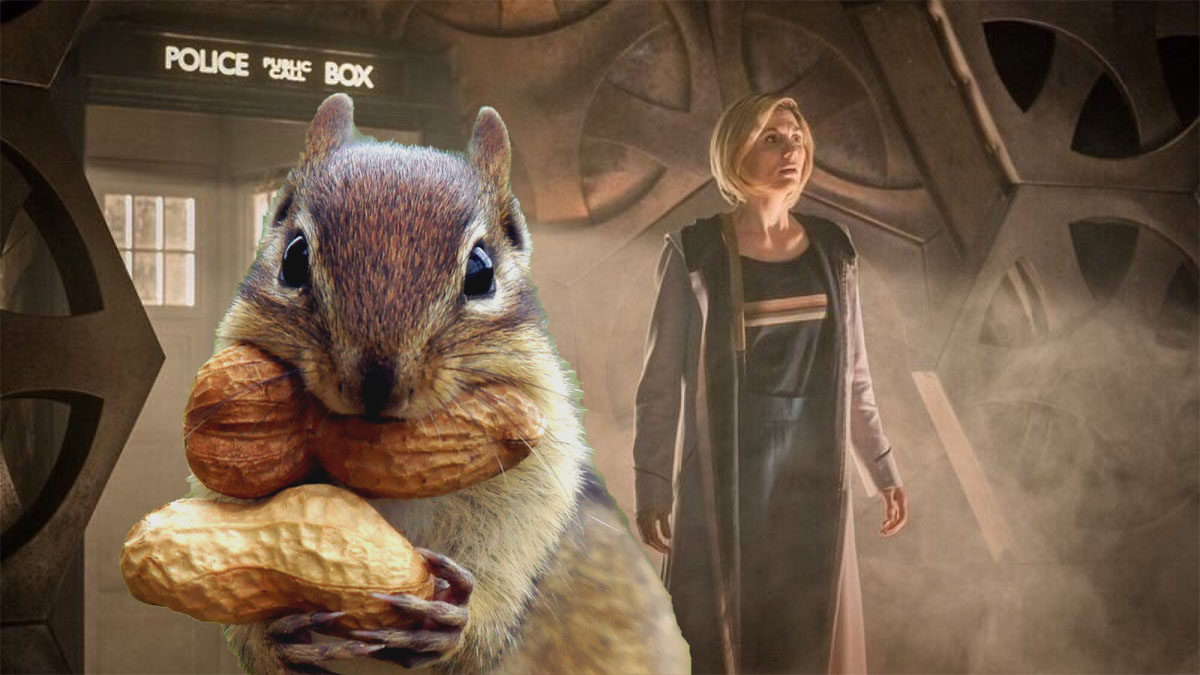Doctor Who series 12 episode 7 review: Can You Hear Me?
Team TARDIS are living the dream in this week’s surreal episode of Doctor Who. Spoilers after the squirrel…
This review contains spoilers after the squirrel.
12.7 Can You Hear Me?
Well, that was an odd one.
The ‘next time’ teaser for Can You Hear Me?, which is one of those episodes that confounds reviewers by forcing them to insert random punctuation into the middle of sentences, didn’t give much away beyond a vague sense of creeping, monsters-under-the-bed-style terror – the sort of episode Mark Gatiss might have penned a decade ago. Even the official trailer seemed more interested in reminding us that there’s a (quote) ‘explosive finale’ in a couple of weeks than getting us excited for the adventure we were actually getting served up next.
As such, if you haven’t watched Can You Hear Me? yet you might be wondering what sort of an episode you’ll be in for. Suffice to say it’s not quite the eldritch horror you might be expecting; it’s chilling rather than outright scary. There’s a little bit of everything in there, in fact, and the desaturated, dreamlike tone of it all is quite similar to last series’ It Takes You Away or some of Torchwood’s more sinister episodes.
Penned by playwright Charlene James along with Chris Chibnall, this is a stately episode, one that’s in no hurry to rush through a relatively straightforward story. There are a good few call-backs to the classic era of Doctor Who, and there are moments – particularly during the Doctor’s first clash with the ‘bogeyman’ from the trailer – that would have been great cliffhangers back in the days of four-part serials. As ever there’s some great production work on offer, including a really bonkers sci-fi set, although the episode struggles to make one of its most important story elements look and feel anywhere near as interesting. To talk more about that involves spoilers, however, so take it away, Daphne…

Much like Spyfall, this week’s episode begins with the companions making flying visits back home to friends and family, seemingly at Yaz’s request so that she can attend an anniversary meal with her sister, Sonya. It’s hardly a happy occasion, though, and there are some strong hints that the Khans have a personal tragedy in their lives that we’ll be exploring in a future episode. (The temptation of a time machine, plus Yaz’s stubborn streak, is just asking for trouble…)
These domestic scenes are slow, sombre and weighty; the black dog of depression is packed into Tibo’s flat and it’s evident from the clutter, the grey light and the physical obstacles between Ryan and his friend. Even before Space-Voldemort arrives to harvest nightmares, the cinematography makes it clear that there’s something’s very wrong in Tibo’s world. Fourteenth-century Aleppo, likewise, is dingy and about as dark as can be without leaving us being unable to see the actors’ faces. When we witness the burst of vivid colours and disjointed imagery that accompany Graham’s unexpected vision during a night of cards, it’s a truly striking contrast.
This visual artistry continues through into the nameless, gorgeous orbital platform – the TARDIS’s destination after the Doctor hooks Graham up to the telepathic circuits so they can track down his psychic mystery caller. The set’s all shiny black floors and long neon strips looping around the place, with traditional buttons and control panels replaced with ethereal strands of cable so that you work the computers like you’re playing the harp. Later, aboard the same platform, we’re treated to a unique animation sequence to accompany the villains’ backstory, something that would probably have just been spoken exposition most weeks.
Read more: Doctor Who series 12 finale is titled The Timeless Children
Given the wealth of visual imagination and skilful direction on display, you would think that the nightmares which form the core of this episode would be something pretty special to behold. Admittedly, dreams are tricky to get right. After all, we struggle to convey our own nightmares to others in a way that gets across just how emotionally intense they were.
When TV tries to capture that same mixed-up, disjointed jumble, the results are often mixed. Buffy the Vampire Slayer did a great job of placing the mundane conversations that fill so many dreams against a tapestry of utter insanity, whereas Star Trek: The Next Generation regrettably gave us Counsellor Troi soaring through space like a confused Supergirl. As far as Doctor Who goes, it’s a shame that given all the visual spectacle that’s present in the waking world, Can You Hear Me?’s dream sequences are neither creative nor cringe-inducing, just remarkably… unremarkable compared to what’s around them.
Take Graham’s dream, for instance. He’s lying on a hospital bed, he’s told that his cancer has returned and he’ll be dead in a matter of hours – and the woman delivering this grim news is Grace, who then admonishes Graham for failing to save her. These dreams are meant to represent the companions facing their greatest fears, to be truly nightmarish, and yet the scene does very little to portray the anguish that we know Graham should be feeling – the kind of panicked vulnerability the episode keeps insisting our nightmares provide. Bradley Walsh might as well have been told his car’s failed its MOT. We are told, rather than shown, that these dreams are deeply traumatic.
You could make the case that in an episode where scenes in the waking world have been so deliberately understated, the terror of the companions’ dreams also needed to be downplayed so as not to seem campy, but it’s not as if this episode is without its fair share of chewed scenery. Most of it comes from Zellin, an immortal creature played by Ian Gelder, who we last saw as the conniving Mr. Dekker in Torchwood: Children of Earth. Zellin, it transpires, has been deliberately leading the Doctor astray so that she’ll do his dirty work and release his partner-in-crime from her interstellar prison.
Zellin is an unapologetic, moustache-twirling villain who could have been lifted straight from a Tom Baker serial – he’s certainly happy enough to namedrop a few of the bad guys from that era, including the Celestial Toymaker and the Black Guardian. He prowls around the Doctor with such evident glee at his own malevolence, it’s like the TARDIS has accidentally landed in Palpatine’s throne room. It’s here we learn that Zellin has been harvesting the bad dreams of humanity in order to sustain his fellow immortal, Rakaya. (Yes, this episode has literal nightmare fuel.)
Read more: Doctor Who’s Fugitive Of The Judoon twist echoes a 35-year-old fan theory
Zellin is effectively creepy and the idea of disembodied fingers zipping about and wedging themselves in your ears is surprisingly eerie (sorry) given how silly it sounds on paper. His master plan feels a little bit muddled, though, given that it’s Rakaya’s psychic message and not investigating nightmares that leads the Doctor into his trap. Why go to Aleppo at all? And why fashion the Chagaskas – the ape-like monsters that open the episode – in the first place? It’s not like Zellin needs the extra muscle. “I’m immortal and got bored” only carries a character so far.
Once Rakaya is released the pair zip away, leaving the Doctor and Team TARDIS trussed up and trapped in their own personal nightmares, presumably forever. The plot wobbles a bit here, as we’re asked to take it in stride that the Doctor can rouse herself out of her dreams (fair enough) and that she can make her sonic screwdriver shoot straight up out of her pocket and catch it by banging her hip against the wall. (Um…)
Once everyone’s free, it’s back to Earth to confront Zellin and Rakaya before humanity becomes their personal bad dream buffet. If this really was a classic era serial, it’d be easy to imagine the Doctor turning the villains’ desire to experience human suffering against them, goading them or tricking them into doing something that would ultimately see them destroyed. As it is, the Doctor turns up with a piece of Alien Tech and waves the sonic around while Tahira conquers her fear, takes command of the Chagaskas and uses one to menace the bad guys, who seem quite worried about being nibbled on despite supposedly being immortal. One screwdriver later, both the would-be god and goddess are zapped back into prison and the episode is free to wrap things up.
Inspired by Tahira’s display of strength in confronting her nightmares, Tibo and the companions take turns opening up to one another about what it is they fear, raising questions about their future as travellers in time and space. Graham’s decision to talk to an extraordinarily reticent Doctor about his previous battle with cancer can’t help but raise a question, though. Given the various outer-space hospitals, nanogenes and medical technology we’ve seen over the years, is the Doctor really unable to give Graham a quick shot of something that could cure him for good? Either way, the she’s not willing to let Team TARDIS be introspective for too long, and soon whisks them away to go and do something involving Frankenstein. (The Eighth Doctor and Mary Shelley might want words with you about that, Thirteen…)
All of which leaves us with one of those episodes that could really have done with being a two-parter. An extra fifty minutes would have afforded the chance to spend some extra time in the companions’ dreams so they could be a little more ambiguous and threatening, the opportunity to have the Chagaskas pose a more persistent danger, and time for the Doctor to struggle against the problem and really earn her victory against two immortal beings. Grumbles aside, there’s plenty of style and a good old panto villain to enjoy this week, even if younger viewers will insist on going to bed wearing earplugs.
Until next week, then. Don’t have nightmares.
